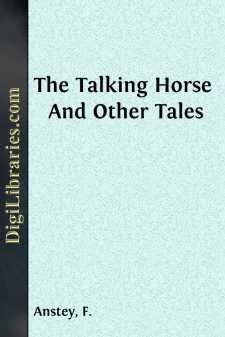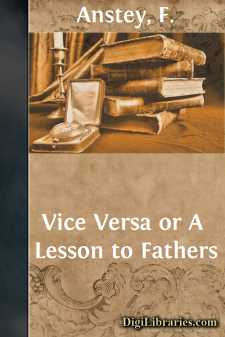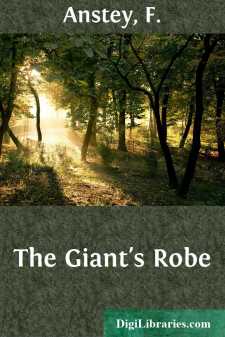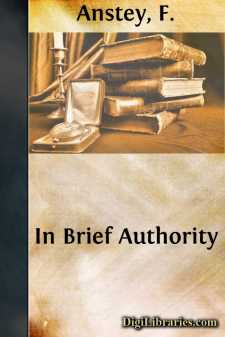Categories
- Antiques & Collectibles 13
- Architecture 36
- Art 48
- Bibles 22
- Biography & Autobiography 815
- Body, Mind & Spirit 144
- Business & Economics 28
- Children's Books 18
- Children's Fiction 14
- Computers 4
- Cooking 94
- Crafts & Hobbies 4
- Drama 346
- Education 58
- Family & Relationships 59
- Fiction 11835
- Games 19
- Gardening 17
- Health & Fitness 34
- History 1378
- House & Home 1
- Humor 147
- Juvenile Fiction 1873
- Juvenile Nonfiction 202
- Language Arts & Disciplines 89
- Law 16
- Literary Collections 686
- Literary Criticism 179
- Mathematics 13
- Medical 41
- Music 40
- Nature 180
- Non-Classifiable 1768
- Performing Arts 7
- Periodicals 1453
- Philosophy 65
- Photography 2
- Poetry 896
- Political Science 203
- Psychology 44
- Reference 154
- Religion 515
- Science 126
- Self-Help 85
- Social Science 83
- Sports & Recreation 34
- Study Aids 3
- Technology & Engineering 60
- Transportation 23
- Travel 463
- True Crime 29
F. Anstey
Thomas Anstey Guthrie (1856–1934), known by his pen name F. Anstey, was an English novelist and humorist renowned for his comic fantasies. His most famous work, "Vice Versa" (1882), is a satirical novel about a father and son who magically switch bodies, which has been adapted into various films and plays. Guthrie's wit and inventive storytelling earned him a significant place in Victorian literature, contributing to the genre of light fiction.
Author's Books:
Sort by:
by:
F. Anstey
CHAPTER I HORACE VENTIMORE RECEIVES A COMMISSION "This day six weeks—just six weeks ago!" Horace Ventimore said, half aloud, to himself, and pulled out his watch. "Half-past twelve—what was I doing at half-past twelve?" As he sat at the window of his office in Great Cloister Street, Westminster, he made his thoughts travel back to a certain glorious morning in August which now...
more...
by:
F. Anstey
"Ther hopped Hawkyn,Ther daunsed Dawkyn,Ther trumped Tomkyn...." The Tournament of Tottenham. In Southampton Row, Bloomsbury, there is a small alley or passage leading into Queen Square, and rendered inaccessible to all but foot passengers by some iron posts. The shops in this passage are of a subdued exterior, and are overshadowed by a dingy old edifice dedicated to St. George the Martyr,...
more...
by:
F. Anstey
THE TALKING HORSE It was on the way to Sandown Park that I met him first, on that horribly wet July afternoon when Bendigo won the Eclipse Stakes. He sat opposite to me in the train going down, and my attention was first attracted to him by the marked contrast between his appearance and his attire: he had not thought fit to adopt the regulation costume for such occasions, and I think I never saw a man...
more...
by:
F. Anstey
PREFACE There is an old story of a punctiliously polite Greek, who, while performing the funeral of an infant daughter, felt bound to make his excuses to the spectators for "bringing out such a ridiculously small corpse to so large a crowd." The Author, although he trusts that the present production has more vitality than the Greek gentleman's child, still feels that in these days of...
more...
by:
F. Anstey
THE INCONSIDERATE WAITER, By J. M. BARRIE Frequently I have to ask myself in the street for the name of the man I bowed to just now, and then, before I can answer, the wind of the first corner blows him from my memory. I have a theory, however, that those puzzling faces, which pass before I can see who cut the coat, all belong to club waiters. Until William forced his affairs upon me that was all I did...
more...
by:
F. Anstey
AN INTERCESSOR. IN the heart of the City, but fended off from the roar and rattle of traffic by a ring of shops, and under the shadow of a smoke-begrimed classical church, stands—or rather stood, for they have removed it recently—the large public school of St. Peter's. Entering the heavy old gate, against which the shops on both sides huddled close, you passed into the atmosphere of scholastic...
more...
by:
F. Anstey
"THE SKIRTS OF HAPPY CHANCE" On a certain afternoon in March Mrs. Sidney Stimpson (or rather Mrs. Sidney Wibberley-Stimpson, as a recent legacy from a distant relative had provided her with an excuse for styling herself) was sitting alone in her drawing-room at "Inglegarth," Gablehurst. "Inglegarth" was the name she had chosen for the house on coming to live there some years...
more...








